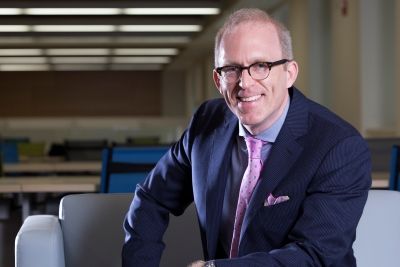
Professor Darryl Robinson helped draft the current leading definition of crimes against humanity. Now he wants to modernize this area of law to deal with contemporary non-state actors, such as terrorist groups or corporations. A $91,000 research grant from the Social Sciences and Humanities Research Council (SSHRC) will help him do just that.
“Situations of mass atrocity, such as in Syria and Iraq, currently threaten thousands of human beings and have dislocated millions,” says Robinson. “Prosecutions for crimes against humanity are part of the world’s response. Unfortunately, the law is currently in a state of confusion. The precedents are sparse, so judges are struggling to fill in gaps. Some of their impressionistic tests have led to the collapse of meritorious cases for terrible atrocities.”
The major doctrinal disputes today actually reflect competing intuitions about the crime, he argues. “By laying bare the underlying theories, we can develop interpretations that are conceptually coherent, legally grounded and practically effective.”
In this vein, Robinson has submitted amicus briefs before the International Criminal Court (ICC) and the Cambodian chambers prosecuting the Khmer Rouge. One of his arguments is that judges should not construct models based only on the highly bureaucratic crimes of the Nazis – what the law should reflect is the diverse range of human organizations that can unleash widespread violence against civilians.
Instead of focusing solely on cases from international tribunals, Robinson will look closely at national cases from jurisdictions in Latin America, Africa, Europe and Asia. “Everyone is using the international cases. What I have found is that many national courts have had to think about crimes about humanity and they have come up with some very helpful insights.”
For his research, the majority of his grant funds will be used to hire JD and PhD students as research assistants to aid in the project. “This is crucial because cases from foreign jurisdictions are difficult to access and search.” Students will also help make the research data and main findings available on the “Legal Tools” Database, a tool now accessed by several thousand lawyers in all regions of the world.
In addition, the money will be used to interview national and international prosecutors about challenging cases. “As much as academics try to come up with difficult hypotheticals to test ideas,” says Robinson, “the most perplexing and unforeseen questions still arise from actual cases.”
By Anthony Pugh